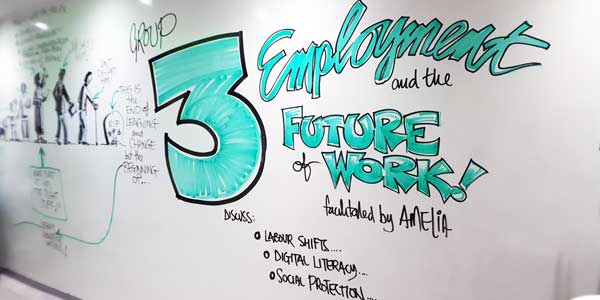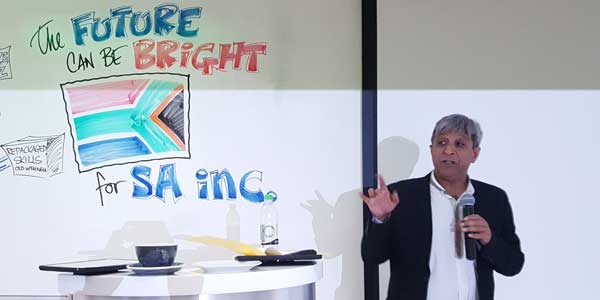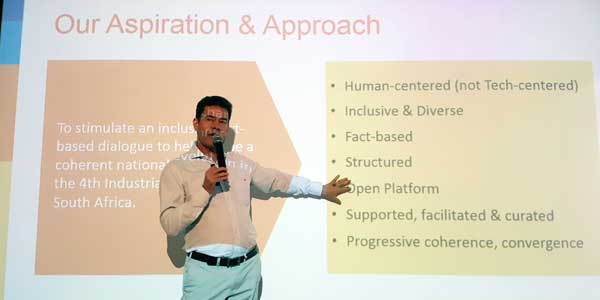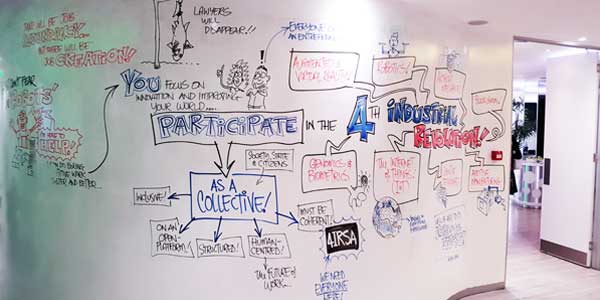We are facing our biggest leadership challenge yet
- Wits University
It is not the robots that will take our jobs but a crisis of imagination and leadership, says futurist Valter Adão.
Speaking at the second workshop held by the newly established Partnership for the 4th Industrial Revolution in South Africa (#4IRSA), an alliance between Telkom and the Universities of the Witwatersrand, Johannesburg and Fort Hare, Valter Adão, Chief Digital and Innovation Officer at Deloitte Africa said in the Digital Age the fear of losing our jobs are both “rational and emotional”.
While the odds are stacked against South Africa to successfully navigate the Fourth Industrial Revolution (4IR) – such as the current unemployment rate of 27.7%, low productivity and inequality – our biggest challenge is not the impact of exponential technological advances but rather a crisis in leadership.
“It is not the technology that is creating our job losses but our inability to make the shift, for a variety of reasons, into this new automated economy and be globally competitive. There is nothing preventing us from this shift but a crisis of imagination and leadership,” he said.

The future of work was a key theme during this one-day workshop, facilitated by the #4IRSA Operational Committee and Deloitte South Africa, for representatives of the ICT sector: from fixed and wireless telecommunications operators; IT systems integrators and service providers; industry associations; OEMs; global digital companies and OTTs; local entrepreneurs; the regulator, and the Department of Communications, Telecommunications and Postal Services.
Adão said all sectors are in the path of change brought about by the 4IR, especially the ICT sector where some the biggest and fastest changes are happening.
However, the Digital Age is not about technology alone. While technology might be ‘the enabler’ of the 4IR, Adão said our focus has been on ‘predicting’ what these changes will be even though we can now only predict about 18 months into the future (then things change again). “To steer technological change, we have to move away from ‘predicting’ what will come to ‘navigating’ what is happening,” he said.
This is where the ICT sector plays crucial role as contributors and enablers to navigate the Digital Age.

“Job losses and shifting jobs are inevitable and part of the natural progression of economies,” Adão said, “However, with the 4IR we need jobs to enable the exponential technologies created today. These new jobs that will be created are going to be jobs that leverage new technologies, such as jobs in machine learning, robotics and so on.
“But these new jobs that will be created are jobs that will benefit the privilege few; those with skills, the means and access to continued education. And this is where the opportunity lies. These new technologies (and access to it) are now moving away from the domain of the rich and large organisations and can be in the hands of very, very basic entrepreneurs; like someone sitting in a shack or in a rural area who now access exponential technologies,” he said, giving examples of the impact disruptive technologies like Uber have had on local economies.
These skills are not present in the South African economy at the moment and that is where our biggest challenge lies: to develop the skills required to compete in this digital economy.
Professor Adam Habib, Vice-Chancellor and Principal of Wits University, echoed this: “We cannot stop the advances in innovation and technology but it should not be an exclusive space for the elite. We must develop these high level skills in great numbers”.

Coherent, collective response
Framing the workshop group discussions, Professor Brian Armstrong, Chair in Digital Business in the Wits Business School and Secretary of the #4IRSA Partnership, introduced the three themes that all sector workshops, including the ICT workshop, will discuss:
- Competitiveness, Concentration and Inequality
- Employment and the Future of Work
- Society, State and Citizen
“#4IRSA wants to help frame the challenges facing South Africa in the Digital Age and find a coherent, collective response for the country,” he said.

About the workshops
The first workshop held in November 2018 that focused on the Public Sector, with representatives from various government departments and research entities committing to share processes more widely and seek better coherence between the various parties’ 4IR initiatives.
The next sector workshops will focus on:
- Heavy Industry, Mining and Infrastructure
- Agriculture, Foodstuffs and Health Products
- Financial and Business Services
- Manufacturing
For the latest news on Wits University’s involvement in the #4IRSA Partnership, visit http://www.wits.ac.za/future/; and for news from the #4IRSA alliance, visit https://4irsa.org/.
Follow the conversations on Twitter:
- @Wits_News
- @4IRSA
- #4IRSA

About the #4IRSA Partnership
Stimulating dialogue, insight and action to shape a #4IR response for South Africa – Brian Armstrong, Secretary of the #4IRSA Partnership
The Partnership for the 4th Industrial Revolution in South Africa (#4IRSA) is an alliance between Telkom and the Universities of the Witwatersrand, Johannesburg and Fort Hare.
Its purpose is to stimulate and facilitate an inclusive national dialogue to shape a coherent national response to the 4th Industrial Revolution in South Africa. It aims to complement and support other national activities relating to the 4IR, most notably the Presidential Commission on the 4IR.
The 4IRSA Partnership recognises that there are several 4IR-related processes and dialogues underway in South Africa: in government, industry, academia and society at large.
However, these are, in the main, fragmented, eclectic and divergent, and indeed there is a high level of unawareness of each other between these processes. The 4IRSA Partnership aims to provide a platform for all these processes and stimulate shared conversation, so that they become mutually visible, thereby facilitating progressive coherence between them, moving from fragmented divergence towards complementarity.
Following a host of workshops early in 2019, the next steps will be:
A Summit of Principles (SOP) is scheduled for end of March 2019. This will include representatives of all of the above industries, related government departments, labour and other stakeholders. The objectives of the Summit of Principles are: to build alignment, participation and momentum for the 4IRSA process; share sector workshop outputs; agree on key areas for further research and deliberation; and agree on a framework for further action and the roadmap towards the Summit of Declarations.
The Summit of Declarations is anticipated to be held in the 4th quarter of 2019. The objective of the Summit of Declarations are: to consolidate all workstream reports into a comprehensive national response; for all stakeholders of each sector represented to table and commit to a short, medium and long term response by that sector to the 4th IR, in the form of a declaration for that sector; to agree monitoring and evaluation mechanisms; to agree further areas of dialogue and research.

